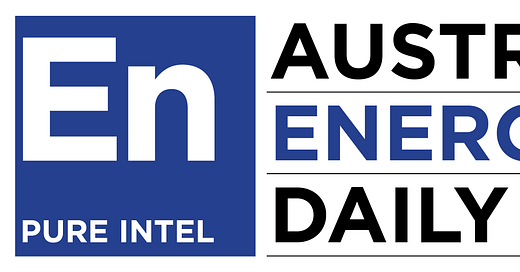Day 52: 'The stick can go back in the bag'
An introductory weekday newsletter from Schwartz Media. Counting the days since Australia had an energy policy.

Good morning and welcome to day 52.
Today in summary: Federal Energy Minister Angus Taylor issues a plea to industry to work with him to avoid the “big stick” of market intervention; the retailer reliability component of the now-dead NEG looks set to be resurrected later this month; and ExxonMobil steps up lobbying for a carbon price.
— Charis
Today’s policy spin level: 💨💨💨💨💨
Please don’t keep Australian Energy Daily to yourself. Forward this email to your colleagues and encourage them to sign up for free here.
“Work with me to deliver and the big stick can go back in the bag,” Energy Minister Angus Taylor told a room full of energy executives this morning, as he reaffirmed the government’s commitment to the retailer reliability obligation.
"We expect to see price reductions given the increase in prices that we've seen in recent years. Our preference is the industry leads this and government plays as light a touch a role as is possible."
Taylor said he would be raising the Commonwealth's commitment to the retailer reliability obligation at the COAG Energy Council meeting on October 26.
Australian Financial ReviewSpeaking after Taylor, Opposition energy spokesman Mark Butler said he would support the implementation of the reliability component of the dumped National Energy Guarantee.
"I think it would be a real pity if we lost that work particularly in the reliability part of the NEG."
The reliability mechanism involves regularly updated electricity generation forecasts running out to 10 years. These would be used to force retailers to shore up enough capacity to meet future demand.
Oil and gas giant ExxonMobile has given US$1 million to “Americans for Carbon Dividends,” an advocacy group lobbying for a US$40 per tonne carbon price. The company has long supported a carbon price, despite being a member of the American Petroleum Institute, which has opposed one. Under the advocacy group’s plan, money raised from the tax would be redistributed to US households.
“Exxon’s $1 million pledge represents the amount it generated about every two minutes last year, based on revenue data compiled by Bloomberg. But the commitment appears to stand out from the company’s other political spending. For instance, Exxon reported $11.4 million in total lobbying expenses in 2017.”
Coming up
Federal Energy Minister Angus Taylor will appear on a panel discussing “Where to next for a national energy policy that responds to domestic concerns and international commitments?” in Melbourne tomorrow. The panel is part of the Melbourne Institute’s annual Outlook conference.
The Commentariat
“Japan has declared its intention to be the world’s first nation to use hydrogen as a mainstream fuel” and Australia has the resources on hand to produce and export it by sea, writes Australia’s Chief Scientist Alan Finkel. The price of producing hydrogen in large quantities is falling, making hydrogen a realistic energy contender.
“There are two viable technology pathways: splitting water into hydrogen and oxygen using electricity from solar, wind and hydro; and deriving hydrogen from coal or methane, combined with carbon capture and sequestration. Japan’s audacious vision has turbo-charged the race.”
Pushes by the Greens and Queensland government for a publicly owned electricity retailer are “accompanied by general recognition that the national electricity market has been a complete failure,” writes the University of Queensland’s John Quiggin.
“Why has Australia done so badly? The reform process in Australia has treated markets and competition as goals in themselves, rather than as policy instruments designed to produce useful price signals and thereby guide investment and consumption decisions.”
Three more things
A new US wind and solar power lobby group is pushing for the electricity market rules to be rewritten to “level the playing field” for renewables. The newly formed, Washington-based Wind Solar Alliance is worried about the US Energy Department’s advanced grid resilience policy that would reward baseload coal and nuclear generators for being more reliable. The group says the market doesn’t capture the value of renewables and “in some cases, [renewables] face implicit barriers to entry that were entirely unintentional since no one imagined the current portfolio”.
Forbes“European Union nations, voicing concern over a U.N. report on global warming, agreed on Tuesday to seek a 35 percent cut in car emissions by 2030, as Germany warned that overly challenging targets risked harming industry and jobs.” The consensus came after more than 13 hours of talks, as environment ministers sought to strike a balance between reducing pollution and preserving industry competitiveness.
ReutersUS President Donald Trump will direct the US Environment Protection Agency to clear the way for petrol stations to offer 15% ethanol blends year-round. Most gasoline available in the United States is blended with up to 10% ethanol, but the EPA prevents a 15% blended fuel being sold during the summer months.
Forbes
This is an introductory service while we’re building a comprehensive daily paid online publication, coming in early 2019.
We’re not here to take sides, simply to cut through the noise, and help you make sense of the emerging policy and market trends you need to be across. We call it pure intel. You can read more about us here.


